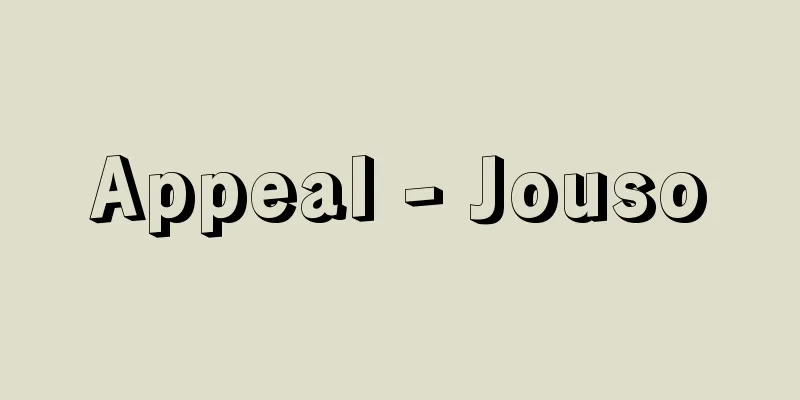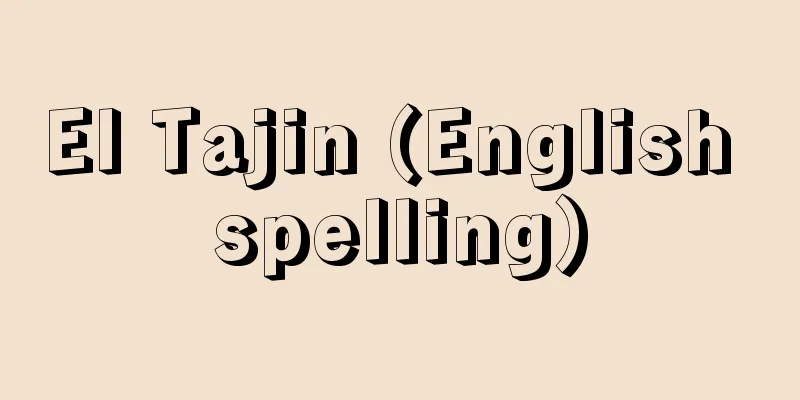Appeal - Jouso

|
A petition to a higher court to request the annulment or modification of a judgment when an appeal against the judgment arises before the judgment is finalized. [Ichiro Uchida] Appeals in criminal casesIt refers to a request for a remedial judgment from a higher court regarding an undecided trial, specifically an appeal, a final appeal, and a complaint against a court. The right to appeal and the period for appeal are stipulated by law. In order to appeal, there must be an interest in the appeal. Furthermore, under the current law, an appeal is only permitted if there is a statutory reason. Grounds for appeal include violation of the law of the litigation procedure as an absolute ground for appeal, violation of the law of the litigation procedure as a relative ground for appeal, as well as incorrect application of the law, inappropriate sentencing, misperception of facts, and changes in circumstances after the judgment. Grounds for appeal include violation of the Constitution or incorrect interpretation of the Constitution, and a judgment that contradicts the Supreme Court's precedent. An appeal can be made against a decision made by a court, except when there is a provision that specifically allows an immediate appeal. However, this does not apply when there is a special provision in the Code of Criminal Procedure (Article 420, paragraph 1, Article 427, Article 428, paragraph 1). If a valid appeal is made, the same lawsuit will remain pending at a higher court (the effect of a transfer of trial), and an appeal to the Supreme Court, appeal to the Supreme Court, and summary appeal suspend the finality of the judgment as well as its enforcement. Appeals other than summary appeals do not have the effect of suspending execution unless the execution is stayed by decision. Persons who have the right to waive or withdraw an appeal are also stipulated by law. Appeals against sentences of death penalty or life imprisonment or incarceration cannot be waived. Those who have waived or withdrawn an appeal cannot appeal again. [Ichiro Uchida] Appeals in civil casesAn appeal in a civil lawsuit is a method of appeal filed by the parties in the lawsuit to a higher court, in principle, to seek the cancellation or modification of an unfinalized judgment that is disadvantageous to the party in question. When an appeal is filed, it has the effect of "transferring the case to a higher court," and the effect of "stabbing" the judgment that is being appealed against, blocking its finality and preventing it from becoming enforceable. Then, as a continuation of the original lawsuit procedure, a trial is held at the higher court to determine the validity of the judgment. Because of the above characteristics, appeals are distinguished from the following procedures. That is, an action for retrial (Article 338 of the Civil Procedure Code) has something in common with an appeal in that it is an appeal to seek the annulment or modification of a judgment, but since the subject of the appeal is a final judgment, it is not an appeal. Similarly, an action for retrial against a decision or order (Article 349 of the same Code) is not an appeal. An action for the annulment of a decision for removal of title (Article 108 of the Non-Contentious Cases Procedure Code) or an action for the annulment of an arbitral award (Article 44 of the Arbitration Act) are appeals to seek the annulment of the judgment alone, separate from the case in which the appeal was filed, and therefore are different from appeals in which a higher court determines the validity of the original judgment. In addition, if an appeal against a judgment is filed in the original court that rendered the judgment, the appeal (objection) is not an appeal (for example, Articles 357, 367, paragraph 2, 386, paragraph 2, 390, 393 of the Civil Procedure Code, etc.). There are three types of appeals: appeal to the Supreme Court, appeal against the Supreme Court, and appeal against a ruling. The reason for the distinction between higher and lower courts in judicial institutions and the permission to appeal against rulings made by lower courts is to ensure that the rights of the parties are properly protected by repeating the proceedings, and to give the parties a sense of satisfaction from the satisfaction of the proceedings. In particular, the appeal system (Articles 311 and following of the Code of Civil Procedure) and the reappeal system (Article 330 of the same code) are intended to unify the interpretation and application of laws and regulations. [Takeyoshi Uchida and Tetsuo Kato, May 19, 2016] [Reference] | | | | | | | | |Source: Shogakukan Encyclopedia Nipponica About Encyclopedia Nipponica Information | Legend |
|
裁判の確定前に、その裁判に不服が生じた場合、上級裁判所に対して行う裁判の取消しまたは変更を求める申立てのこと。 [内田一郎] 刑事訴訟における上訴未確定の裁判に関する上級裁判所の救済的裁判の請求をいい、具体的には控訴、上告、抗告をいう。上訴権者、上訴期間は法定されている。上訴をするには上訴の利益がなければならない。さらに、現行法は、上訴は、法定の理由のある場合に限ってこれを認めている。控訴申立て理由としては、絶対的控訴理由としての訴訟手続の法令違反、相対的控訴理由としての訴訟手続の法令違反のほか、法令の適用の誤り、量刑不当、事実の誤認、判決後の事情の変更などがあり、上告申立ての理由としては、憲法違反または憲法解釈の誤り、最高裁判所の判例と相反する判断をしたことなどがある。抗告は、とくに即時抗告をすることができる旨の規定がある場合のほか、裁判所のした決定に対してこれをすることができる。ただし、刑事訴訟法に特別の定めのある場合(420条1項、427条、428条1項)はこの限りでない。適法の上訴があれば、同一訴訟は引き続き上級裁判所に係属し(移審の効力)、控訴、上告および即時抗告は、裁判の確定力を停止すると同時にその執行力をも停止させる。即時抗告以外の抗告は、決定をもって執行を停止しない限り、執行停止の効力を生じない。上訴の放棄・取下権者も法定されている。死刑または無期の懲役もしくは禁錮に処する判決に対する上訴は、これを放棄することができない。上訴の放棄または取下げをした者は再上訴することができない。 [内田一郎] 民事訴訟における上訴民事訴訟の上訴とは、自己に不利益な未確定の裁判について、有利に取消しまたは変更を求めるため、原則として当該訴訟の当事者から上級裁判所に提起する不服申立ての方法をいう。上訴の提起があると、その事件を上級審に係属させる「移審の効力」と、不服を申し立てた裁判の確定を遮断し、かつ執行力の発生を止める「停止の効力」とを生ずる。そして原審の訴訟手続の続行として、裁判の当否を判断するために上級裁判所において審理裁判が行われる。 上訴は、以上のような性格から次のような諸手続とは区別される。すなわち、再審の訴え(民事訴訟法338条)は判決の取消しまたは変更を求めるための不服申立てである点で上訴と共通点を有するが、その対象が確定判決であるので上訴ではない。同様に、決定・命令に対する再審の申立て(同法349条)も上訴ではない。除権決定に対するその取消しの申立て(非訟事件手続法108条)や仲裁判断取消しの申立て(仲裁法44条)は、申立て事件とは別個に、裁判だけの取消しを求める不服申立てであるから、上級裁判所が原裁判の当否について判断する上訴とは異なる。また、裁判に対する不服申立てが、その裁判をした原裁判所でなされる場合には、その不服申立て(異議)は上訴ではない(たとえば民事訴訟法357条、367条2項、386条2項、390条、393条など)。 上訴には、控訴、上告、抗告の3種がある。裁判機関に上級審、下級審の区別を設けて、下級裁判所の裁判に対して上訴を許すのは、反覆して審理を行うことによって、当事者の権利保護が適正に行われることを保証し、また当事者に審理の充足による満足感を与えるためである。ことに上告制度(民事訴訟法311条以下)、再抗告制度(同法330条)においては、法規の解釈適用を統一することにも目的がある。 [内田武吉・加藤哲夫 2016年5月19日] [参照項目] | | | | | | | | |出典 小学館 日本大百科全書(ニッポニカ)日本大百科全書(ニッポニカ)について 情報 | 凡例 |
Recommend
Çatal Hüyük (English spelling)
A prehistoric site located 40km southeast of Koniy...
Green rice leafhopper (English spelling)
An insect of the Hemiptera family, Cicadellidae (i...
Hirokata Yashiro
A scholar of Japanese classics in the late Edo pe...
Moley, R.
...In the 1932 US presidential election, the Demo...
Shinmachi - Shinmachi
[1] [noun] A newly opened town. *Tenshohonkyogen, ...
Tamano [city] - Tamano
A city located in the central part of the Kojima P...
Azuchi-Momoyama culture
The culture of the Azuchi-Momoyama period, when Od...
Insurance agent - hoken dairiten (English spelling) insurance agent
An agent is a person whose business is to continuo...
Pedestrian crossing - Oudan Hodoukyo
...A bridge for pedestrians to pass over. Some ro...
Apartment
…A hotel is a structure in which one enters a cou...
Chinese cabbage (Taisai) - Brassica rapa var. chinensis
It is an annual or biennial plant of the Brassicac...
Hornblende (Amphibole)
A general term for a group of hydrous silicate min...
Copper Road - Akagane Kaido
A highway connecting Hiratsuka in the southeast of...
Oharame - Oharame
Kabuki dance. Nagauta. A piece from the original t...
Lampetra japonica (English spelling) Lampetra japonica
...There are five species of lamprey in the seas ...







![Yugawara [town] - Yugawara](/upload/images/67cd1308ba6eb.webp)
![Apres [river] - Apres](/upload/images/67cf37c0918a1.webp)
